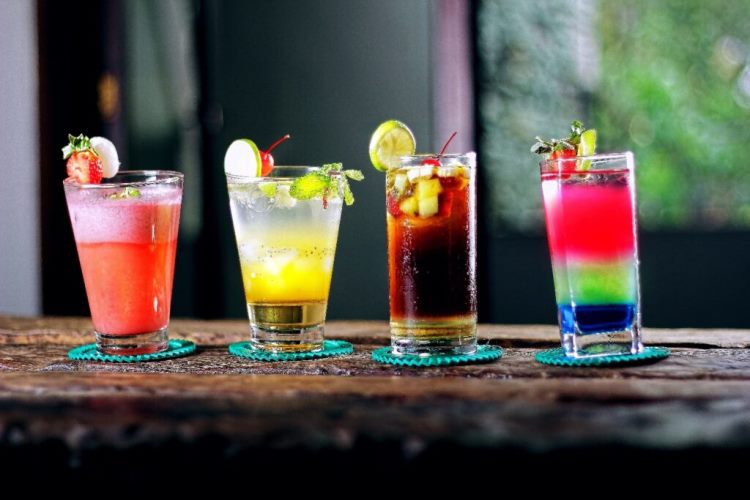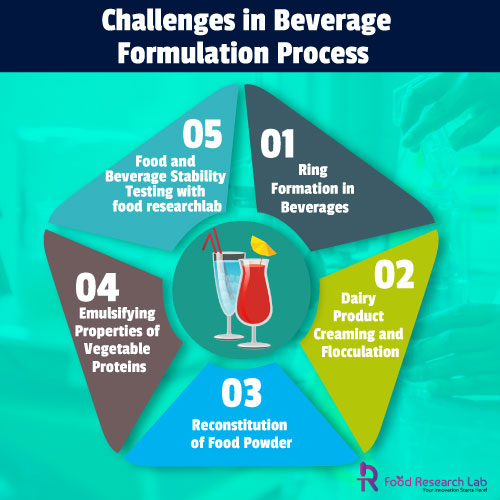
Challenges & Shelf-life in Beverage Formulation
In-Brief:
- The demand for new functional beverages has seen tremendous growth over the past several years.
- While it is essential to include the functional ingredients, the consumer won’t return for a second try if the beverage doesn’t taste good.
- The food research lab explains the challenges and shelf-life process during the beverage formulation in beverages formulation companies. Also, avail our beverage product development services and food and beverage product development consulting services
Introduction:
Consequently, refining the stability of colloidal systems exploited in food goods and beverages is essential in preserving the quality of beverage products over time and guaranteeing the best customer perception. The principal issue of food and beverage process development consultancy is the complicated nature of colloidal variability mechanics. Different disruption phenomena can affect colloids based on the dispersion’s interacting raw materials, environmental or storage climate, and request or delivery type.
Challenges in the beverage formulation process
Ring Formation in Beverages
Ring development is an often happening crumbling measure that effects concentrated beverages. It is a kind of creaming that occurs in the menisci of scatterings where surface strain makes the liquid’s concentrated period fix to within the holder, creating a ring. It can require as long as a half year before getting evident to the unaided eye. Be that as it may, products should be tried in a period a lot more limited than this. Measuring specialists are regularly said to restrict the impacts of thickness varieties between dispersive oil beads and the watery stage to increment colloidal steadiness; however, most usually in beverage development the UK

Dairy Product Creaming and Flocculation
Creaming is a profoundly perplexing unsteadiness activity affected by a scope of material attributes and mechanical impacts. It is an essential wonder which influences the Shelf-life of realistic usability of different milk products; the rate and degree of which will contrast dependent on a fat substance, the homogeneity of fat globules in the watery stage. Extra minerals like calcium (Ca) or other implications, such as proteins and microorganisms, from the beverage development consultants’ guidance
Unmistakable products can likewise make soundness testing more mind-boggling. Dairy products that are fat-and sugar-unrestrained choice have widely unique insecurity mechanics to standard products. Creaming will, in this manner, occur at different rates in similar conditions for homogenized and non-homogenized milk products, with the speedier development of thicker creaming layers happening in both semi-skimmed and full-fat non-homogenized milk.

Reconstitution of Food Powder
Previously, the dairy business has alleviated the test of colloidal precariousness by getting dried out milk products into a powder that must be rehydrated when required for any food and beverage development. The powder is cost-effective and saves space, alongside green activities, making it an ideal arrangement.
Then again, the lack of hydration makes a large group of different difficulties from strength. The properties of the reconstituted product should be dissected to recognize its comparability to the local structure. Contrasts in the worldwide soundness of rehydrated milk powders may propose a generally low-quality product or imperfect rehydration techniques.
Food powder strength is frequently perceived by its breakdown energy, which can be recognized by boundaries as shifted as dispersibility, wettability, and drinkability.
Assessing the nature of dry powders to be utilized in the reconstitution of fluids implies a full comprehension of how well a powder layer enters water volume is required. Alongside knowing how proficiently it can oppose fluid surface strain to sink into the liquid, and the rate at which a residue layer breaks down in the liquid.
Emulsifying Properties of Vegetable Proteins
Market moves likewise present necessary deterrents to food and beverage steadiness. The expense and accessibility of significant fixings can influence the return of investments (ROIs) from finished results.
By evaluating the potential emulsifying qualities of plant proteins like pea and soybean extricates, specialists endeavour to lessen creature proteins’ utilization. It has become a worry of moral, business, and environmental significance. Plant proteins are a side-effect right now, with a meagre evident worth.
Using this loss for emulsification will have impressive advantages to the planet, removing our reliance on creature products following the harmless to the ecosystem pattern towards veganism. This requires an intensive comprehension of test colloid’s worldwide dependability, alongside the drop size and protein focus.
Food and Beverage Stability Testing with Food research Lab
Food research Lab works in definition designing and dependability testing, with a scope of cutting edge instrumentation made with the extraordinary difficulties of food and beverage markets as a top priority.
Shelf-life of realistic usability of beverage plan
Survey Formula and Storage Conditions
For your Shelf-life of usability study to be exact, your drink ought to be made in a manner that reflects typical creation. These could be tests from pilot plants or tests from a full creation run. Seat tops examples may not be illustrative of a genuine creation run (because of scale-up blunder). Shelf-life of usability is affected by fixings, product and product guarantees, bundling, temperature openness and taking care of, and anticipated use in the wake of opening.
Distinguish Factors for Safety and Quality
In the wake of looking into the recipe and capacity conditions, the required organoleptic quality and food handling principles should be illustrated. Like healthful substance, any legal cases will likewise be considered into testing for any supplements that may corrupt after some time. The testing program will rely upon the client and legal necessities and follow licensed testing techniques.
Testing
A few techniques for testing can be utilized to help decide a product’s Shelf-life of realistic usability. Two of the most well-known are the primary and accelerated testing strategies.
Break down Results and Set Shelf Life
The last Shelf-life of realistic usability study report checks that your product is rack stable and builds up time boundaries from creation, dissemination, deal, and utilization. A Shelf-life of real usability study should likewise stretch out past the actual expiry date to guarantee that your drink is protected past the expiry date stamped. Shelf-life of usability testing should be re-approved on the off chance that you roll out any improvements to your recipe or creation techniques.
Conclusion:
A cautious approach must be taken until significant real-life data can be assessed. Any challenge test will only yield a specific result for the samples under test and the conditions under which the test was conducted. The food research lab explains the challenges and shelf-life process during the beverage formulation in beverages formulation companies. Also, please make use of our beverage recipe development services
References:
- Maswal, M., & Dar, A. A. (2014). Formulation challenges in encapsulation and delivery of citral for improved food quality. Food Hydrocolloids, 37, 182-195.
- Molet-Rodríguez, A., Salvia-Trujillo, L., & Martín-Belloso, O. (2018). Beverage emulsions: key aspects of their formulation and physicochemical stability. Beverages, 4(3), 70.
- Kilcast, D., & Subramaniam, P. (Eds.). (2011). Food and beverage stability and shelf life. Elsevier.






